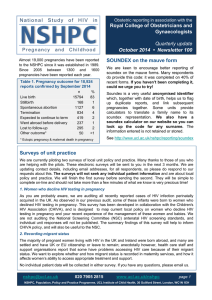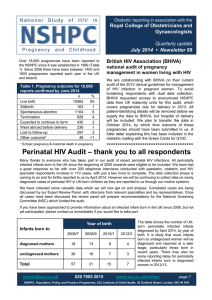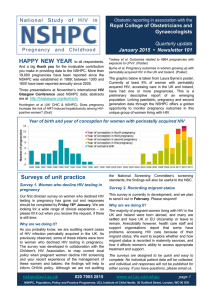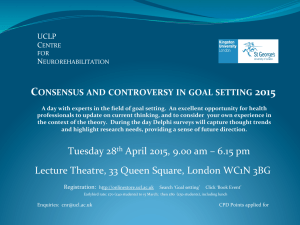Royal College of Obstetricians and Gynaecologists Quarterly update April 2015 • Newsletter 102
advertisement
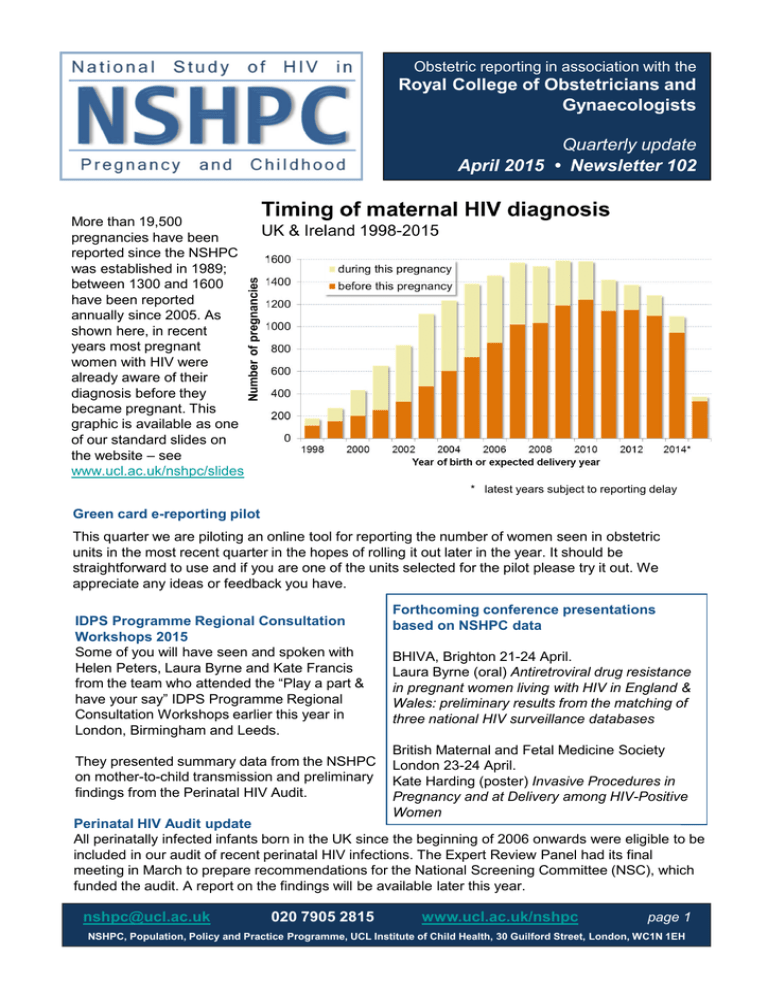
Obstetric reporting in association with the Royal College of Obstetricians and Gynaecologists Quarterly update April 2015 • Newsletter 102 More than 19,500 pregnancies have been reported since the NSHPC was established in 1989; between 1300 and 1600 have been reported annually since 2005. As shown here, in recent years most pregnant women with HIV were already aware of their diagnosis before they became pregnant. This graphic is available as one of our standard slides on the website – see www.ucl.ac.uk/nshpc/slides * latest years subject to reporting delay Green card e-reporting pilot This quarter we are piloting an online tool for reporting the number of women seen in obstetric units in the most recent quarter in the hopes of rolling it out later in the year. It should be straightforward to use and if you are one of the units selected for the pilot please try it out. We appreciate any ideas or feedback you have. IDPS Programme Regional Consultation Workshops 2015 Some of you will have seen and spoken with Helen Peters, Laura Byrne and Kate Francis from the team who attended the “Play a part & have your say” IDPS Programme Regional Consultation Workshops earlier this year in London, Birmingham and Leeds. They presented summary data from the NSHPC on mother-to-child transmission and preliminary findings from the Perinatal HIV Audit. Forthcoming conference presentations based on NSHPC data BHIVA, Brighton 21-24 April. Laura Byrne (oral) Antiretroviral drug resistance in pregnant women living with HIV in England & Wales: preliminary results from the matching of three national HIV surveillance databases British Maternal and Fetal Medicine Society London 23-24 April. Kate Harding (poster) Invasive Procedures in Pregnancy and at Delivery among HIV-Positive Women Perinatal HIV Audit update All perinatally infected infants born in the UK since the beginning of 2006 onwards were eligible to be included in our audit of recent perinatal HIV infections. The Expert Review Panel had its final meeting in March to prepare recommendations for the National Screening Committee (NSC), which funded the audit. A report on the findings will be available later this year. nshpc@ucl.ac.uk 020 7905 2815 www.ucl.ac.uk/nshpc page 1 NSHPC, Population, Policy and Practice Programme, UCL Institute of Child Health, 30 Guilford Street, London, WC1N 1EH NSHPC Quarterly Update • April 2015 Children born to HIV positive women Table 1 includes data from the paediatric reporting scheme, run in parallel with the obstetric scheme. Paediatric data are collected via the RCPCH’s British Paediatric Surveillance Unit, through its orange card system, and directly from some larger paediatric units. Table 1. Year of birth and infection status for children born in the UK & Ireland to women diagnosed by the time of delivery (reports to the end of March 2015) Year of birth UK infected indeterminate uninfected Ireland infected indeterminate uninfected Total (UK & Ireland) pre 1990 14 18 104 6 0 40 182 1990-99 2000-01 87 13 117 87 691 704 4 4 6 2 63 125 968 935 2002-03 16 101 1352 5 9 252 1735 2004-05 23 99 1990 1 10 205 2328 2006-07 18 105 2356 0 5 222 2706 2008-09 12 122 2396 2 4 237 2773 2010-11 8 275 2212 2 3 193 2693 2012-13 5 1068 1113 0 9 181 2376 2014-15 2 647 260 0 8 24 941 198 2639 13178 24 56 1542 17637 Total 780 infected children born in the UK or Ireland to women undiagnosed at the time of delivery have also been reported. Outstanding cards and forms SOUNDEX Please get in touch if you have any suggestions or questions about the study, and please return green cards promptly. We are waiting for over 400 mauve, and almost 200 yellow outcome forms, so please complete and return those too. Please complete the surname scrambler Soundex on the forms. It was completed on 43% of recent mauve forms (but only 17% of paediatric forms). This anonymised identifier, along with date of birth, helps us flag up duplicate reports and link subsequent pregnancies. Some units provide calculators which translate a family name to its Soundex representation. We have a calculator on our website so you can look up the code for any surname; information entered is not retained or stored in the calculator. See www.ucl.ac.uk/nshpc/soundex Contact us if you are behind with the reports, or are having problems providing the information, and we’ll try to find a way to help nshpc@ucl.ac.uk National Screening Committee newsletter The latest newsletter from the NSC’s Infectious Diseases in Pregnancy Screening Programme is available at www.screening.nhs.uk/screeningmatters NSHPC website Our updated slide set, and full study details including forms etc. are at www.ucl.ac.uk/nshpc ETHICS approval MREC/04/2/009 Current NSHPC funding, gratefully acknowledged, is primarily from Public Health England and the National Screening Committee NSHPC team Mario Cortina-Borja (co-investigator/statistician) Pat Tookey (principal investigator) Helen Peters (data manager/statistician) Claire Thorne (co-investigator) Angela Jackson (research assistant) Icina Shakes (administrative assistant) Graziella Favarato (research assistant) Kate Francis (administrative assistant) Laura Byrne (Clinical Research Training Fellow) nshpc@ucl.ac.uk 020 7905 2815 NSHPC Population, Policy and Practice Programme www.ucl.ac.uk/nshpc UCL Institute of Child Health page 2 30 Guilford Street London WC1N 1EH
